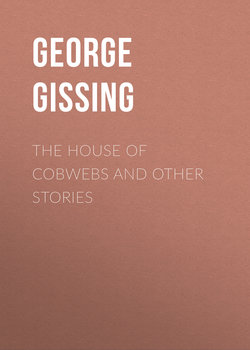The House of Cobwebs and Other Stories

Реклама. ООО «ЛитРес», ИНН: 7719571260.
Оглавление
George Gissing. The House of Cobwebs and Other Stories
THE WORK OF GEORGE GISSING
A CHRONOLOGICAL RECORD
THE HOUSE OF COBWEBS
A CAPITALIST
CHRISTOPHERSON
HUMPLEBEE
THE SCRUPULOUS FATHER
A POOR GENTLEMAN
MISS RODNEY'S LEISURE
A DAUGHTER OF THE LODGE
THE RIDING-WHIP
FATE AND THE APOTHECARY
TOPHAM'S CHANCE
CHAPTER I
CHAPTER II
CHAPTER III
CHAPTER IV
A LODGER IN MAZE POND
THE SALT OF THE EARTH
THE PIG AND WHISTLE
Отрывок из книги
1880. Workers in the Dawn. 1884. The Unclassed. 1886. Isabel Clarendon. 1886. Demos. 1887. Thyrza. 1888. A Life's Morning. 1889. The Nether World. 1890. The Emancipated. 1891. New Grub Street. 1892. Born in Exile. 1892. Denzil Quarrier. 1893. The Odd Women. 1894. In the Year of Jubilee. 1895. The Paying Guest. 1895. Sleeping Fires. 1895. Eve's Ransom. 1897. The Whirlpool. 1898. Human Odds and Ends: Stories and Sketches. 1898. The Town Traveller. 1898. Charles Dickens: a Critical Study. 1899. The Crown of Life. 1901. Our Friend the Charlatan. 1901. By the Ionian Sea. Notes of a Ramble in Southern Italy. 1903. Forster's Life of Dickens—Abridgement. 1903. The Private Papers of Henry Ryecroft. 1904. Veranilda: a Romance. 1905. Will Warburton: a Romance of Real Life. 1906. The House of Cobwebs, and other Stories.
[Of notices and reviews of George Gissing other than those mentioned in the foregoing notes the following is a selection:—Times, 29 Dec. 1903; Guardian, 6 Jan. 1904; Outlook, 2 Jan. 1904; Sphere, 9 Jan. 1904; Athenaeum, 2 and 16 Jan. 1904; Academy, 9 Jan. 1904 (pp. 40 and 46); New York Nation, 11 June 1903 (an adverse but interesting paper on the anti-social side of Gissing); The Bookman (New York), vol. xviii.; Independent Review, Feb. 1904; Fortnightly Review, Feb. 1904; Contemporary Review, Aug. 1897; C.F.G. Masterman's In Peril of Change, 1905, pp. 68-73; Atlantic Monthly, xciii. 280; Upton Letters, 1905, p. 206.]
.....
In less than a week Mr. Spicer and he were so friendly that they began to eat together, taking it in turns to prepare the meal. Now and then they walked in company, and every evening they sat smoking (very cheap tobacco) in the wild garden. Little by little Mr. Spicer revealed the facts of his history. He had begun life, in a midland town, as a chemist's errand-boy, and by steady perseverance, with a little pecuniary help from relatives, had at length risen to the position of chemist's assistant. For five-and-twenty years he practised such rigid economy that, having no one but himself to provide for, he began to foresee a possibility of passing his old age elsewhere than in the workhouse. Then befell the death of his uncle, which was to have important consequences for him. Mr. Spicer told the story of this exciting moment late one evening, when, kept indoors by rain, the companions sat together upstairs, one on each side of the rusty and empty fireplace.
'All my life, Mr. Goldthorpe, I've thought what a delightful thing it must be to have a house of one's own. I mean, really of one's own; not only a rented house, but one in which you could live and die, feeling that no one had a right to turn you out. Often and often I've dreamt of it, and tried to imagine what the feeling would be like. Not a large, fine house—oh dear, no! I didn't care how small it might be; indeed, the smaller the better for a man of my sort. Well, then, you can imagine how it came upon me when I heard—But let me tell you first that I hadn't seen my uncle for fifteen years or more. I had always thought him a well-to-do man, and I knew he wasn't married, but the truth is, it never came into my head that he might leave me something. Picture me, Mr. Goldthorpe—you have imagination, sir—standing behind the counter and thinking about nothing but business, when in comes a young gentleman—I see him now—and asks for Mr. Spicer. "Spicer is my name, sir," I said. "And you are the nephew," were his next words, "of the late Mr. Isaac Spicer, of Clapham, London?" That shook me, sir, I assure you it did, but I hope I behaved decently. The young gentleman went on to tell me that my uncle had left no will, and that I was believed to be his next-of-kin, and that if so, I inherited all his property, the principal part of which was three houses in London. Now try and think, Mr. Goldthorpe, what sort of state I was in after hearing that. You're an intellectual man, and you can enter into another's mind. Three houses! Well, sir, you know what houses those were. I came up to London at once (it was last autumn), and I saw my uncle's lawyer, and he told me all about the property, and I saw it for myself. Ah, Mr. Goldthorpe! If ever a man suffered a bitter disappointment, sir!'
.....